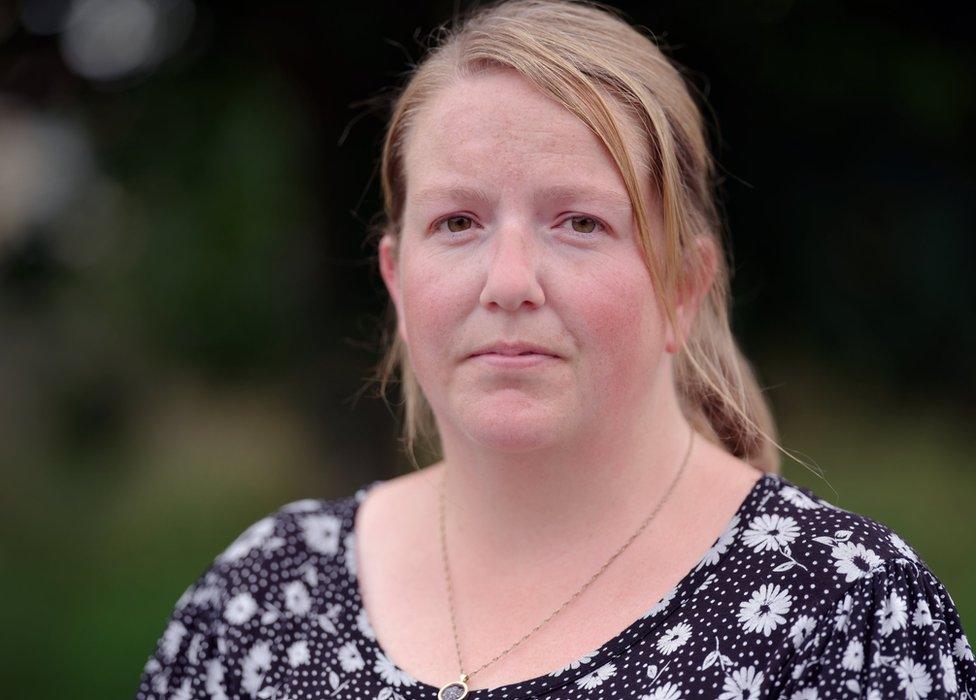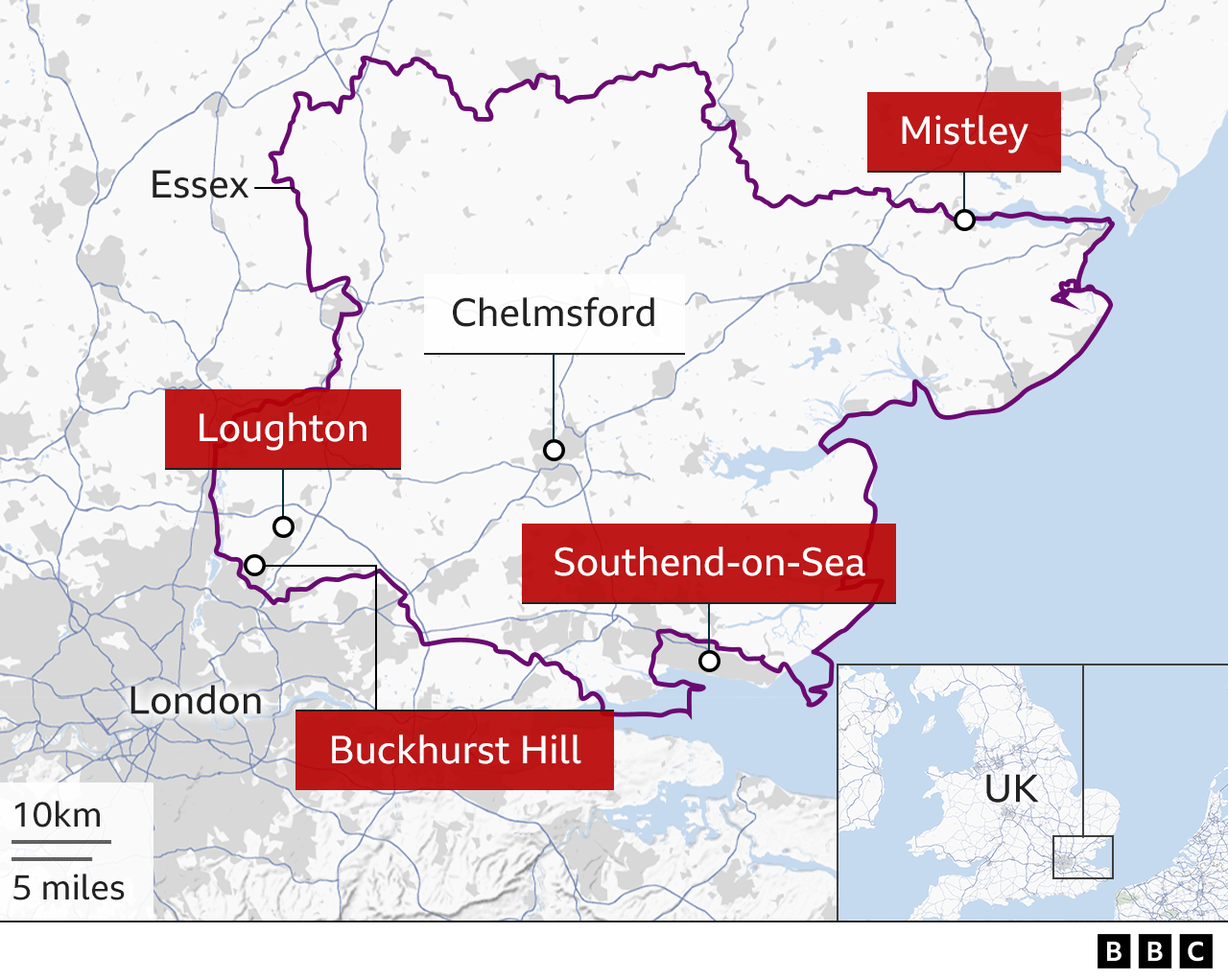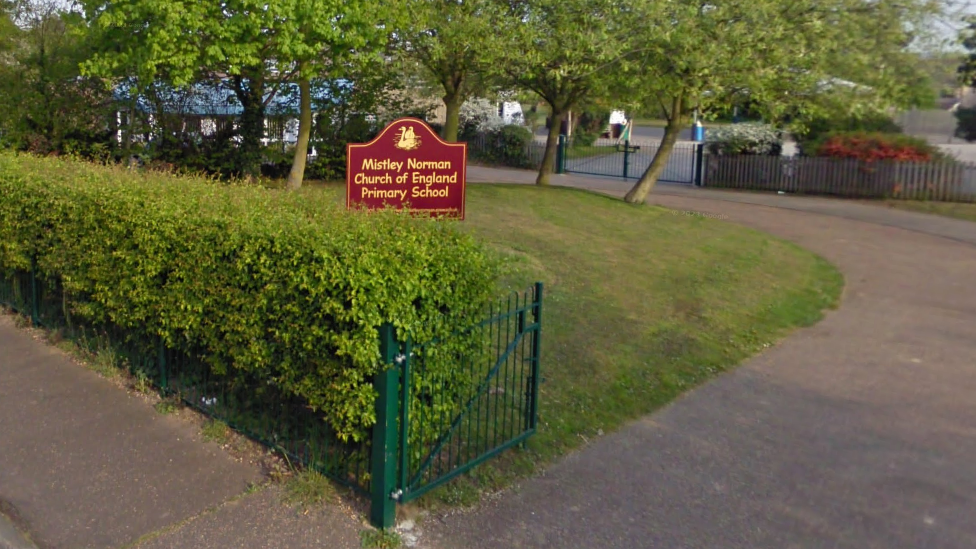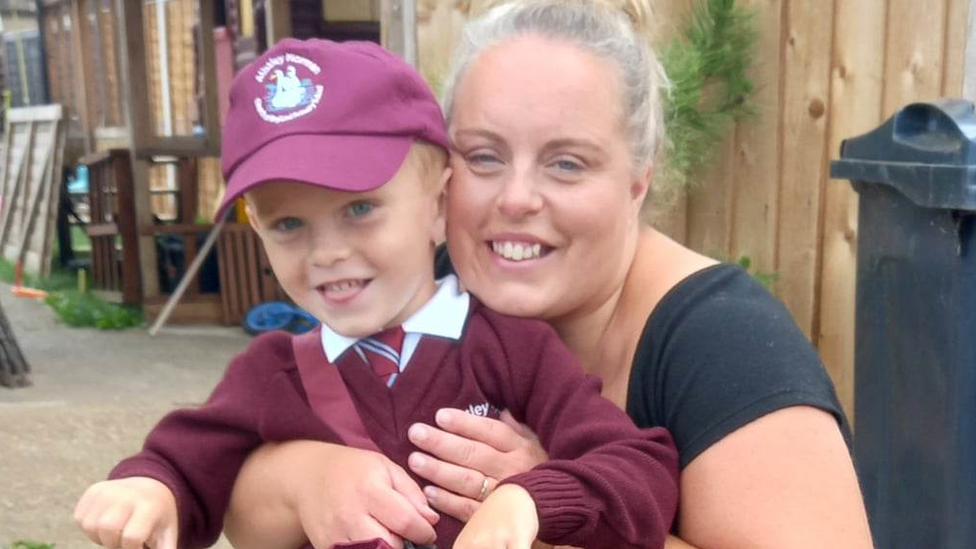How Essex found itself at the heart of the school concrete crisis
- Published

Jodie, pictured with all her four children, now has to do three different school runs
As the school concrete crisis started to unfold, it quickly became clear the epicentre was in the county of Essex, which has by far the highest number of schools affected.
Instead of heading back to their classrooms, some pupils discovered they would be taught in sports halls, dining rooms or different schools entirely, while others would be learning online.
But in the small riverside village of Mistley, in the north-east of the county, the problem hit home months ago.
The local primary was one of the first in England to be closed due to reinforced autoclaved aerated concrete (Raac), with the pupils taught elsewhere since April.
Mother-of-four Jodie says she "can't explain how stressful the situation has been".

Jodie has managed to find a place in a nearby village for her six-year-old daughter Emilie to start year two this week but there were no spaces for her 10-year-old daughter Maddie
She managed to find a place in a nearby village for her six-year-old daughter Emilie to start year two this week. But there were no spaces for her 10-year-old daughter Maddie, who has remained with her original school, which is putting on a bus to another one eight miles (13km) away.
"Emilie has just started at her third school in the last six months. It is so confusing for her and she hasn't settled in properly yet, her older sister was her security blanket," she says.
"I'm currently doing three different school runs and the petrol costs are really mounting up. I used to love walking them all to the same school. None of this is anything I ever wanted for my children."

Melanie says the disruption has been particularly worrying for children like her daughter Jessica who is autistic
Fifty miles (80km) away in Southend, Melanie has been "hugely worried" about her 12-year-old daughter Jessica, who is autistic.
Jessica attends Kingsdown School, which is the only special school affected by the crisis. It was a "huge relief" when Melanie found out it will partially reopen on Monday.
"Jessica needs routine and I can't explain to her what is happening. When she goes back, it will throw her a bit because she will be in a different classroom, but I'm hoping she gets used to it," she says.
The school has been "absolutely amazing", Melanie adds, and staff have managed to secure two unoccupied classrooms in a neighbouring primary school, as well as portable toilets.
But the mitigations are a "short-term solution", the school said in a statement, and it is "not yet known what the long-term solutions could be".

Why is Essex so badly affected by the concrete crisis?

More than a third of the 147 schools identified as having Raac in England are based in Essex. Many of these 54 schools are partially open, with mitigating measures in place.
Essex has a disproportionately high number of buildings dating back to the 1950s and 1960s, because the county saw a huge influx of people moving out from London after World War Two.
Builders did what they thought was best at the time, according to Matthew Byatt, president of The Institute of Structural Engineers.
"Essex has been very hard hit," he says. "There was a real need for new schools, new hospitals and other buildings to be constructed in that period of post-war haste, while the population was increasing so much.
"They knew it had a lifespan but I don't think they knew how much this material would deteriorate over time. Unfortunately, a lot of it wasn't manufactured well and the quality wasn't as good as it should have been.
"I'm an optimistic person but I don't think we've heard of the last of this. There will be more buildings discovered that will require very careful monitoring or replacement."


Parents of children at Buckhurst Community School gathered there on Friday to express their frustration
Over on the western edge of Essex, in Buckhurst Hill, Gabi Besevic-Simpson attended a protest at her daughter's school on Friday.
"We wanted to show our anger and frustration at the situation and our support to our wonderful school and teachers," she says.
Buckhurst Hill Community Primary School is reopening on Monday but the dinner hall will be closed, the sports hall is being repurposed as a classroom and two year groups will be taught at a different school.
"The teachers have worked round the clock but it is quite a big disruption for everyone," she says. "The government has known about this for a long time but it feels like they were waiting for a tragedy to happen before they did something."

Parents say the school staff have been wonderful but they feel let down by the government
Education secretary Gillian Keegan has apologised for the timing of the announcement but said her first duty must be to protect the safety of pupils.
She admits Raac was "already known as a risk, with research conducted by the government in the 1990s", external, but says experts believed spaces could be occupied with ongoing monitoring, until new evidence emerged over the summer.
In nearby Loughton, Helen has two children at Roding Valley High School, which has lost 18 classrooms, all of its catering facilities and some staff workplaces due to Raac.

Helen worries her daughter Evie and son Joey (far right) are missing out due to home learning
Her son Joey is now in year eight, while her daughter Evie is in year 10 and starting her GCSEs. The school has introduced a rota for on-site and home learning, prioritising other year groups "in line with Department for Education guidance".
Helen worries it could be just the start of disruption to their learning.
"Our children are being totally forgotten about in all of this but this is a huge problem for year 10 in particular. My concern is there will be no time to catch her up," she says.
Back in Mistley, on the opposite side of the county, Georgina feels "constantly anxious" about her five-year-old son Tyllar who now has to get a bus to a school 20 minutes away.
"On his first day back, the bus broke down, which really didn't help my nerves. I just worry about him being so far away because I don't drive so I can't get to him straight away if anything was to happen," she says.

Georgina, pictured with Tyllar and his father Marcus, says she is worried about her son's future
Georgina says parents have been "kept in the dark" about the future, and the bus is only guaranteed until the end of the school year. She has had to pay out for a new uniform, book bag and PE bag, which has been a struggle for her.
Emma Wigmore, chief executive of the Diocese of Chelmsford Vine Schools Trust, which runs Mistley Norman, said it did not have the £1.9m needed for remedial works but formed a plan as quickly as possible and communicated it to parents.

Mistley Norman school is transporting pupils to another school eight miles away
"We explored the option of using demountable classrooms, as well as a range of other temporary solutions. It was decided that a bus to another local school would be the most effective option," she said.
Georgina worries that Tyllar's learning will be affected because he is so tired when he gets home from his new school, with it now being a much longer day.

Georgina is worried her son Tyllar's learning will be affected by the concrete crisis
"He is overwhelmed and much more clingy. His class has almost doubled in size so he is not getting as much focus from the teachers. I would like to move him but my options are limited because I don't drive and I haven't been able to afford to learn.
"This has ruined what is meant to be the happiest and easiest part of his life. The whole thing has knocked his confidence and I'm worried I have let him down. I just feel absolutely devastated."

Follow East of England news on Facebook, external, Instagram, external and X, external. Got a story? Email eastofenglandnews@bbc.co.uk, external or WhatsApp us on 0800 169 1830
- Published8 September 2023

- Published7 September 2023

- Published6 September 2023

- Published14 June 2023
